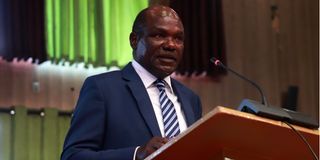BBI clears Chebukati hurdle, moves to county assemblies

IEBC Chairman Wafula Chebukati at the Bomas of Kenya in December 2020.
County assemblies have three months to decide the fate of the proposed constitutional changes pushed by President Kenyatta and former prime minister Raila Odinga following the successful verification of signatures.
Yesterday, the Independent Electoral and Boundaries Commission (IEBC) confirmed the Building Bridges Initiative’s (BBI) draft constitutional amendment Bill had secured the requisite one million signatures of registered voters, paving the way for its submission to the county assemblies.
The constitution requires each county assembly to consider the Bill within three months of its submission by the IEBC. Support of a majority of county assemblies (24) is needed to propel it to the next stage, Parliament.
Should it fail to garner the backing of the majority, the proposals that seek, among other things, to expand the executive through the creation of the posts of a prime minister and two deputies, will collapse. This is the fate that befell the Thirdway Alliance’s Punguza Mizigo initiative, which was ironically killed at the assemblies by a combined onslaught of President Kenyatta’s administration and Mr Odinga’s camp.
High stakes
So high are the stakes that rival factions are taking the referendum battle to the assemblies, which have, in the past, been lobbied by some of Deputy President William Ruto’s allies to reject the draft Bill. Already, a legal row over the scope of MCAs’ mandate is playing out at the Supreme Court, where Attorney-General Kihara Kariuki has argued that they have no powers to amend the Bill.
The AG was responding to applications by Makueni Governor Kivutha Kibwana together with Kericho and Nandi County Assemblies.
The promoters of BBI knew the central role MCAs would play in the passage of the Bill and sought to entice them by dangling the Ward Development Fund carrot, which is pegged at five per cent of county revenue.
In yet another sweetener, the BBI team has also proposed that the wards be considered as the lowest units of planning for development and budgeting, giving more focus to the electoral units ran by the 1,450 MCAs. And, as MCAs debate the Bill, they will consider another proposal that seeks to exempt them from the list of state officers required to resign from office to contest an election, a crucial safeguard given that Gatundu North MP Wanjiku Kibe has had to fight to save her seat after a court nullified her election citing she had not quit as a nominated MCA by the time she contested the polls.
1.1 million
Yesterday, IEBC chairman Wafula Chebukati confirmed that the BBI initiative had the backing of 1.1 million registered voters following verification of submitted signatures.
BBI secretariat co-chairman Dennis Waweru said that, with IEBC’s clearance, “we now have a short time to have the BBI referendum Bill tabled in the assemblies in order to have a referendum conducted as soon as possible”.
In his response to the three applications seeking an advisory opinion from the Supreme Court, the AG submitted that the role of assemblies in the proposed referendum should be restricted to approving or rejecting the Constitutional Amendment Draft Bill, but not introducing further amendments.
He argued that there is no legal requirement that approval of the draft Bill should be taken through the same process as legislation by a county assembly.
Seek advice
The petitioners are seeking advice on whether a Bill to amend the Constitution submitted to the assembly for approval in terms of Article 257(6) of the constitution has to be processed in the same manner as other Bills in the county assembly.
Mr Odinga yesterday also dismissed calls for a multiple question referendum and told off those pushing for the vote to be conducted on the day of the 2022 General Election.
“We now have six ballots; a seventh one for referendum with many questions will be cumbersome for Kenyans especially the illiterate voters,” Mr Odinga said when he met university student leaders at Serena Hotel yesterday.
He pointed out that certain proposals in the Bill require implementation in the next election, hence the need to have the referendum before the poll.
“For instance, the two-thirds gender rule must be actualised in 2022, and I don’t know whether our women are patient to wait until 2027 to see it become a reality,” Mr Odinga said.
Senate Minority Leader James Orengo also dismissed calls for a multiple question referendum.
“In you read Article 257 of the Constitution, it does not talk about a question, it talks about a Bill. But in the Elections Act, there is reference to questions and question which are not about amendment of the Constitution but on a referendum, which the President can initiate on any issue, but excluding a constitutional amendment Bill,” Mr Orengo said.





